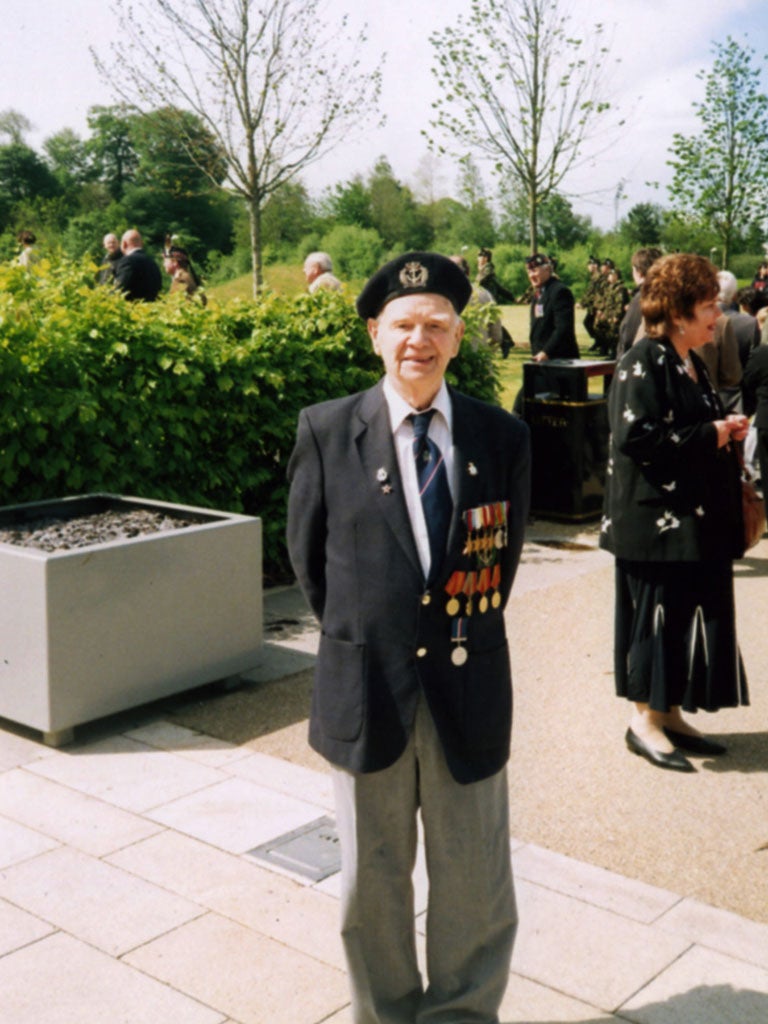Willie Pender: Veteran of the Arctic convoys in the Second World War

Your support helps us to tell the story
Our mission is to deliver unbiased, fact-based reporting that holds power to account and exposes the truth.
Whether $5 or $50, every contribution counts.
Support us to deliver journalism without an agenda.

Louise Thomas
Editor
If ever there were unsung heroes, few can have been less recognised by successive British governments than the sailors of the Royal Navy and Merchant Navy who participated in the Arctic convoys, carrying desperately needed supplies to Murmansk in 1941.
Their numbers are dwindling fast. The picture above shows my friend and former constituent, Willie Pender, standing erect in honour of the Royal Regiment of Scotland on their return from Afghanistan, when they received the Freedom of West Lothian. Proudly, he displays four medals awarded to him by the Russians – but a measly badge for Arctic service bestowed by the British.
After school at Livingston Station and Bathgate Academy, Pender went to work as a dispatch clerk in Edinburgh for a distant relation. Aged 18, he was falsely accused of misdirecting a package scheduled for Glasgow, and in a fit of pique stomped off to join the Navy. During training at Butlin's holiday camp at Skegness, commandeered by the Admiralty, he had a lucky escape: in early 1940, a stray German bomber dived to machine-gun personnel on open ground. Pender flung himself down in time to a shelter; 10 WRNS were killed.
His first ship was the Ranpure, like the Rawalpindi belonging to the P&O. They were nicknamed "coffin-ships"; the task of these armed merchantmen was to divert U-boats away from convoys. Transferred to the destroyer Icarus, Pender and his ship-mates feared they could be consigned to stormy and freezing Arctic waters at any moment in the face of the double threat of U-boats and the Tirpitz cutting loose from a Norwegian fjord.
Pender recalled to me that he and his friends owed their lives to the skill of their captain, Colin Maud, in avoiding, and on occasion intercepting, torpedos. Years after the war, he chuckled to me, he was on holiday on the Isle of Wight, going for a stroll with his wife. Suddenly a voice barked,
"Pender, come here. Don't you recognise your old shipmate?' It was Maud, by that time of flag rank. A good chinwag of reminiscence ensued. Pender reflected: "Colin Maud was a right old sea-salt; when I became a Labour councillor, I always, thanks to Captain Maud, recognised the good in people of different political opinions to myself." So he did – which helped to make him a hugely influential member of West Lothian Council.
No less harrowing was Pender's participation on Icarus in Operation Pedestal in 1942. Malta was close to starvation and running out of supplies. Icarus, the aircraft carrier Eagle – which was torpedoed, and sunk in a massive spillage of oil – and a motley collection of other naval vessels managed to allow the American supply ship SS Ohio, (with a British crew) to limp into Valetta harbour. Had Malta fallen, the Germans would have controlled the Mediterranean and Rommel might well have been victorious in North Africa.
While his captain (who was portrayed by Kenneth More in the film The Longest Day) went back to England for D-Day, Pender was posted to the Far East for the final push against the Japanese. Off the coast of Burma most of the soldiers carried by Pender's ship had reconciled themselves to an Okinawa-like death until the news came through of Hiroshima and Nagasaki. "It was a terrible event," Pender told me, but hearing that I shared a great-great grandmother at five removes with President Truman, he added: "Your distant relative, by dropping the bomb, saved my life and hundreds of thousands of other lives, British, Australian, American and Japanese."
On demobilisation, and happily married to his beloved Esther, Pender worked in the shale mines, and on their closure transferred to the new British Motor Corporation plant at Bathgate, brought to West Lothian by the Macmillan government precisely because pits were closing. In 2002, the year of 60th anniversary celebrations for Malta's freedom, Pender was taken to Malta by his daughter Esther and son-in-law John Hart, to a rapturous reception.
Pender's most significant contribution to public life was as a board member of the Development Corporation of what was to become Scotland's largest New Town. He contributed significantly to the idea that Livingston was not only there to be an attractive hub of industry, but also to blend newcomers from all over Britain with the old established community in which he himself had been reared.
William Pender, sailor, motor-vehicle worker, founding member of Livingston New Town Development Corporation: born Livingston Station 24 February 1921; Royal Navy 1939-1946; worker, British Leyland 1961-1986; West Lothian County Council 1960-75; Member, Livingston Development Corporation 1961-1986; married 1946 Esther (died 1997; three daughters); died Livingston 24 February 2012.
Subscribe to Independent Premium to bookmark this article
Want to bookmark your favourite articles and stories to read or reference later? Start your Independent Premium subscription today.
Join our commenting forum
Join thought-provoking conversations, follow other Independent readers and see their replies
Comments